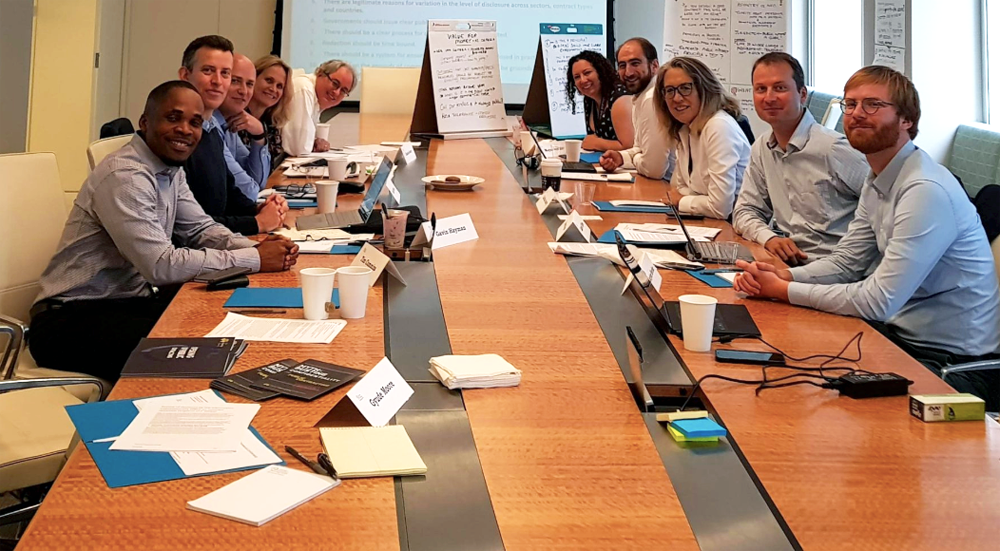The Center for Global Development’s Working Group on Commercial Confidentiality is seeking to answer the question, How open should public contracts be? Government contracts are worth trillions of dollars. Publishing contracting information is critical to enabling fair competition, allowing public scrutiny, and reducing opportunities for corruption. But when is it legitimate to redact commercially sensitive information from these documents?
Our working group is chaired by Caroline Anstey, who led the push for greater transparency on contracts when she was managing director at the World Bank. The group brings together people who have sat on either side of negotiations over complex contracts, as well as people working on designing the underlying systems for procurement and those who have battled from the outside to get access to information on public contracts. All are acting as individuals, not as representatives of their organisations. Together, we’ve developed a draft set of principles expressing the group’s emerging consensus, and we are looking for your inputs.
The full principles are here as an online document you can comment on, and here as a document to download. We’d love comments for attribution or on a confidential basis, and very much welcome advice on whom to reach out to to get the draft principles as much exposure and feedback as possible. You can respond by email to mforstater@cgdev.org or complete the survey.
We developed the principles over two rounds of discussions, drawing on members’ diverse experiences, as well as broader emerging practice. We aim to publish the principles as part of the working group’s output early next year.
Full publication should be the norm, not the exception
One key starting point for the group is the work by the Open Contracting Partnership, led by Gavin Hayman, which argues that there are 35 crucial documents that should be published over the course of planning, inviting bids, awarding, contracting, and implementing a project. OCP recommends that “all information that is not legitimately sensitive should be disclosed unredacted.”
In practice, government bodies approach the question of what is “legitimately sensitive” in different ways, and not always systematically. Oleksii Sobolev and Olexandr Starodubstev, who pioneered the development of the ProZorro system for procurement and asset sales in Ukraine, shared their experience of “everybody sees everything.” Gabriel Sipos, who leads Transparency International in Slovakia, notes that Slovakia’s radical move to enforce contract transparency—“not in force until published online”—has made a huge difference in the integrity and efficiency of procurement in Slovakia. However almost a fifth of contracts published online have the price or the name of the counterparty missing or redacted. Dennis Santiago from the Government Procurement Policy Board in the Philippines shared the board’s experience of pushing municipalities and government departments to publish contracts; often the contract is put online, but annexes may be omitted.
In the extractive industries, contract publication is increasingly the norm, with support of both governments and businesses. The working group draws on experience from the mining sector through Luke Balleny of the International Council on Mining and Minerals and Richard Morgan of Anglo American. In most cases contracts have been published in full, with little need to redact information. Lesley Coldham of the oil company Tullow says that Tullow “does not have any problem with the publication of production sharing agreements… If the country agrees to have these reports published, we will publish.”
In some countries the rules for what gets published or redacted depend on freedom of information laws and how they are implemented. In others procurement policies set specific transparency requirements.
The working group includes practitioners with expertise in different sectors. Lorna Prosper manages defence acquisitions for Canada. Nick Hirons leads global ethics and compliance at pharmaceuticals giant GSK. My CGD colleague Gyude Moore was minister of public works in Liberia, responsible for procuring road, power, and port infrastructure investment as the country began to rebuild after the civil war. Robin Hodess of the B Team is working together with a group of business leaders to make the case for open contracting from a business point of view, arguing that it supports fair competition.
Can a single set of principles be applicable to all? In pharmaceuticals it is argued that prices paid for drugs must be redacted to protect the ability of lower-income countries to secure “tiered pricing” arrangements compared to rich countries with a greater ability to pay. But does this information asymmetry ever really help public health agencies get the best deal?
What should a “public interest” test look like?
One principle which may help bring greater clarity and certainty is the principle of “public interest.” This states that information should only be redacted if the public interest in keeping the information confidential is greater than the public interest in giving people access to it. Many countries have a public interest test as part of their freedom of information laws to allow this principle to be applied on a case-by-case basis. Other countries have set policies which require certain classes of contracts to be published in full. As Eliza Niewiadomska, senior counsel for public procurement at the European Bank for Reconstruction and Development, notes, this approach has been taken by many Eastern European countries. The UK takes a case-by-case approach to considering the public interest in publication. In England and Wales, we found 45 cases of redaction of contract information that were referred to the information commissioner between 2010 and 2018; the public interest case only prevailed in three cases.
While the case for keeping information confidential is often strongly argued based on specific reasons why disclosure could harm a particular business relationship, the case that having more information available in the market to enable competition is much more weakly specified. Could the public interest test be more widely and strongly applied?
Would a case-by-case approach to publishing work?
Another approach is to think about what information definitely should be published in every case, and designing transparency into the contracting system. Jachym Hercher works at the European Commission on developing the new EU data standard for publishing information about public procurement. He argues for a transparency-by-design approach. CGD’s own Owen Barder sits on the working group, bringing UK civil service experience, and has argued that that keeping information on the pricing of agreements confidential is likely to lead to worse not better deals for the public sector, and that information needed to support commercial competition should rarely be redacted.
Through the working group discussions, a key principle has been proposed: information needed to judge the value for money of a contract is crucial. This includes details of what is being bought, sold, leased, or otherwise exchanged; any quality or performance criteria it must meet; and the price that is paid. However, Sally Hughes and Tim Cummins, who lead the International Association for Contract & Commercial Management, note that these “value for money” and performance aspects can often be determined by factors outside the contract, such as issues of underlying competence and the extent to which public sector agencies engage to support success.
DRAFT PRINCIPLES IN SHORT
-
Full contract publication should be the norm—redaction should be the exception, supported by a public interest justification.
-
Government contracting processes should be designed for transparency.
-
There should be an enforcement system for ensuring that contracts and contract information is in fact disclosed in practice and in a usable form.
-
Where there is not an up-front requirement for full publication, any redaction for commercial sensitivity should be based on a robust application of the public interest test.
-
The “public interest test” should take into account the economic benefits of the sharing of commercial information, such as more competitive public contracting, as well as the broader case for the public’s right to know.
-
It is particularly important that the pieces of information needed to judge value for money are disclosed.
-
Governments should issue clear guidance to public entities, agencies and firms on the issue of when contract information may be exempted from publication on the basis of commercial sensitivity to set clear expectations and reduce uncertainty.
-
When a case-by-case redaction approach is used, only the contracting party that claims potential direct financial harm from a specific release of information should be able to request redaction of information.
-
When a case-by-case redaction approach is used, there should be a clear process and time limits for determining what is redacted in individual contracts, why, for how long, and with what appeals process.
-
Redaction on the grounds of commercial confidentiality should be grounds for increased scrutiny through other oversight mechanisms.
The full principles are here and here as a document to download. You can respond by email to mforstater@cgdev.org or complete the survey. Please send comments by October 26.
Disclaimer
CGD blog posts reflect the views of the authors, drawing on prior research and experience in their areas of expertise. CGD is a nonpartisan, independent organization and does not take institutional positions.






